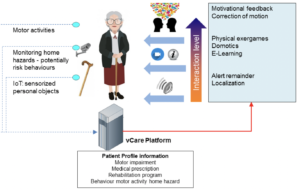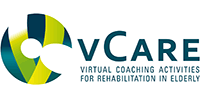What “living with a virtual coach” can mean for a stroke patient
This story illustrates the impact of a virtual coach on the daily life of elderly people. It uses the example of an elderly lady living in Milan, Maria, who has had a stroke and is now back living in her home environment.
 This deficit causes functional motor impairment and Maria has serious problems in managing her life both in domestic environments and in open spaces. The physiatrist prescribes an eight weeks long session of motor rehabilitation treatment using serious games. In addition, the physiatrist suggests light motor activities during the day, the use of an aid (walker/cane) whenever she walks and, to reduce the risk of falling, the avoidance of complex tasks, such as picking up an object fallen on the floor, while remaining in standing position. Back home after being discharged from hospital, Maria needs to gradually learn how to relate to her virtual coach (under the form of a human avatar), which constantly supports her in both her motor and cognitive rehabilitation.
This deficit causes functional motor impairment and Maria has serious problems in managing her life both in domestic environments and in open spaces. The physiatrist prescribes an eight weeks long session of motor rehabilitation treatment using serious games. In addition, the physiatrist suggests light motor activities during the day, the use of an aid (walker/cane) whenever she walks and, to reduce the risk of falling, the avoidance of complex tasks, such as picking up an object fallen on the floor, while remaining in standing position. Back home after being discharged from hospital, Maria needs to gradually learn how to relate to her virtual coach (under the form of a human avatar), which constantly supports her in both her motor and cognitive rehabilitation.
But motor and cognitive rehabilitation is only part of the story. The customized care plan offered by the coach includes also home risk prevention tips, social and well-being promotion, emotional support, practical video tutorials, and physical activity monitoring, to name a few. These features are triggered by specific events and are constantly adapted to Maria’s situation and actions. tor and cognitive rehabilitation is only part of the story
The virtual coach is also meant to support Maria’s psychological state and to encourage behavioral change in order to support Maria’s adherence to the care and rehabilitation plan established by her healthcare provider.
The virtual coach encourages Maria to remain active. It monitors periods of inactivity and continuously stimulates Maria by e.g. proposing a short walk outside if the weather conditions are good. As a result, she will progressively regain a better quality of life, with a progressive reduction of the pain and fatigue that she experienced after her stroke.
There are thousands of health-related thoughts in Maria’s mind that, sometimes, she feels uncomfortable telling anyone: she is afraid of not being understood, repeating the same questions, or is embarrassed to disclose (even to people who could help her). Maria’s weekly experience is scattered with worries and fears about her recurring problems, related to pain in her shoulder, lack of dexterity in her right hand, and disturbance in her gait. Maria complains about difficulties in using her right hand and often says “I feel maladroit and useless”, “I am disappointed about not being able to cook like before”. But surprisingly, Maria’s beliefs might however change over time. Step-by-step, through daily interactions, the virtual coach will help Maria to find the right answers and regain self-confidence.
Thanks to her virtual coach, Maria has now the best chance to complete her rehabilitation in an optimal way.
